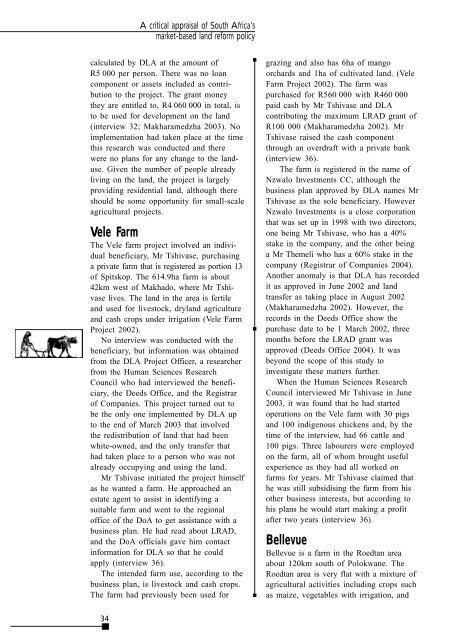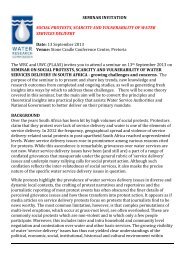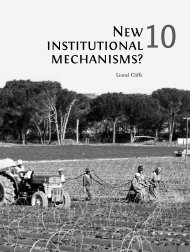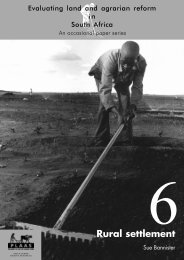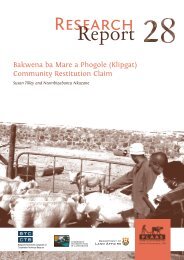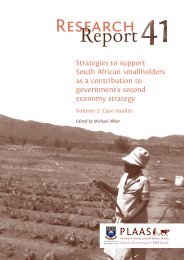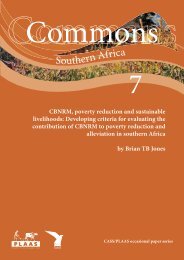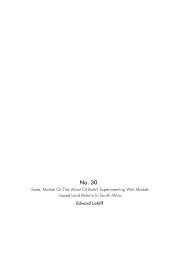A critical appraisal of South Africa's market-based land reform policy
A critical appraisal of South Africa's market-based land reform policy
A critical appraisal of South Africa's market-based land reform policy
You also want an ePaper? Increase the reach of your titles
YUMPU automatically turns print PDFs into web optimized ePapers that Google loves.
A <strong>critical</strong> <strong>appraisal</strong> <strong>of</strong> <strong>South</strong> Africa’s<br />
<strong>market</strong>-<strong>based</strong> <strong>land</strong> <strong>reform</strong> <strong>policy</strong><br />
calculated by DLA at the amount <strong>of</strong><br />
R5 000 per person. There was no loan<br />
component or assets included as contribution<br />
to the project. The grant money<br />
they are entitled to, R4 060 000 in total, is<br />
to be used for development on the <strong>land</strong><br />
(interview 32; Makharamedzha 2003). No<br />
implementation had taken place at the time<br />
this research was conducted and there<br />
were no plans for any change to the <strong>land</strong>use.<br />
Given the number <strong>of</strong> people already<br />
living on the <strong>land</strong>, the project is largely<br />
providing residential <strong>land</strong>, although there<br />
should be some opportunity for small-scale<br />
agricultural projects.<br />
Vele Farm<br />
The Vele farm project involved an individual<br />
beneficiary, Mr Tshivase, purchasing<br />
a private farm that is registered as portion 13<br />
<strong>of</strong> Spitskop. The 614.9ha farm is about<br />
42km west <strong>of</strong> Makhado, where Mr Tshivase<br />
lives. The <strong>land</strong> in the area is fertile<br />
and used for livestock, dry<strong>land</strong> agriculture<br />
and cash crops under irrigation (Vele Farm<br />
Project 2002).<br />
No interview was conducted with the<br />
beneficiary, but information was obtained<br />
from the DLA Project Officer, a researcher<br />
from the Human Sciences Research<br />
Council who had interviewed the beneficiary,<br />
the Deeds Office, and the Registrar<br />
<strong>of</strong> Companies. This project turned out to<br />
be the only one implemented by DLA up<br />
to the end <strong>of</strong> March 2003 that involved<br />
the redistribution <strong>of</strong> <strong>land</strong> that had been<br />
white-owned, and the only transfer that<br />
had taken place to a person who was not<br />
already occupying and using the <strong>land</strong>.<br />
Mr Tshivase initiated the project himself<br />
as he wanted a farm. He approached an<br />
estate agent to assist in identifying a<br />
suitable farm and went to the regional<br />
<strong>of</strong>fice <strong>of</strong> the DoA to get assistance with a<br />
business plan. He had read about LRAD,<br />
and the DoA <strong>of</strong>ficials gave him contact<br />
information for DLA so that he could<br />
apply (interview 36).<br />
The intended farm use, according to the<br />
business plan, is livestock and cash crops.<br />
The farm had previously been used for<br />
grazing and also has 6ha <strong>of</strong> mango<br />
orchards and 1ha <strong>of</strong> cultivated <strong>land</strong>. (Vele<br />
Farm Project 2002). The farm was<br />
purchased for R560 000 with R460 000<br />
paid cash by Mr Tshivase and DLA<br />
contributing the maximum LRAD grant <strong>of</strong><br />
R100 000 (Makharamedzha 2002). Mr<br />
Tshivase raised the cash component<br />
through an overdraft with a private bank<br />
(interview 36).<br />
The farm is registered in the name <strong>of</strong><br />
Nzwalo Investments CC, although the<br />
business plan approved by DLA names Mr<br />
Tshivase as the sole beneficiary. However<br />
Nzwalo Investments is a close corporation<br />
that was set up in 1998 with two directors,<br />
one being Mr Tshivase, who has a 40%<br />
stake in the company, and the other being<br />
a Mr Themeli who has a 60% stake in the<br />
company (Registrar <strong>of</strong> Companies 2004).<br />
Another anomaly is that DLA has recorded<br />
it as approved in June 2002 and <strong>land</strong><br />
transfer as taking place in August 2002<br />
(Makharamedzha 2002). However, the<br />
records in the Deeds Office show the<br />
purchase date to be 1 March 2002, three<br />
months before the LRAD grant was<br />
approved (Deeds Office 2004). It was<br />
beyond the scope <strong>of</strong> this study to<br />
investigate these matters further.<br />
When the Human Sciences Research<br />
Council interviewed Mr Tshivase in June<br />
2003, it was found that he had started<br />
operations on the Vele farm with 30 pigs<br />
and 100 indigenous chickens and, by the<br />
time <strong>of</strong> the interview, had 66 cattle and<br />
100 pigs. Three labourers were employed<br />
on the farm, all <strong>of</strong> whom brought useful<br />
experience as they had all worked on<br />
farms for years. Mr Tshivase claimed that<br />
he was still subsidising the farm from his<br />
other business interests, but according to<br />
his plans he would start making a pr<strong>of</strong>it<br />
after two years (interview 36).<br />
Bellevue<br />
Bellevue is a farm in the Roedtan area<br />
about 120km south <strong>of</strong> Polokwane. The<br />
Roedtan area is very flat with a mixture <strong>of</strong><br />
agricultural activities including crops such<br />
as maize, vegetables with irrigation, and<br />
34


